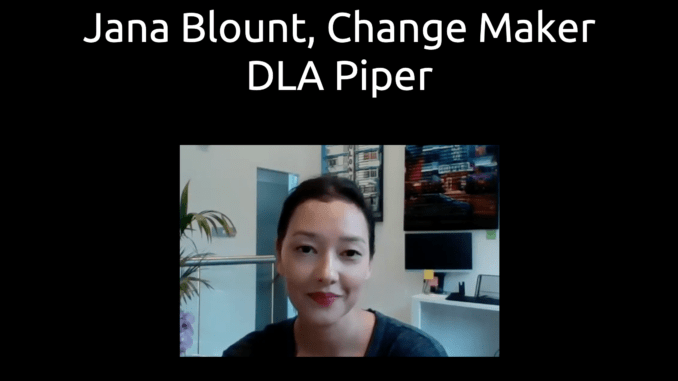
Jana Blount is Change Maker at DLA Piper, a firm with over 4,200 lawyers and offices in more than 40 countries. Her role connects to multiple change projects ranging from ‘Kill Bill‘, a group set up to look at how to move away from the billable hour, to growing DLA’s Aldersgate Group – a new division of the business that covers at present litigation funding, but soon could have other capabilities such as consulting and an AI-driven risk platform.
In the interview (see below) we explore these areas and more, as well as considering the central question: how do you drive real change in a law firm’s business model? Can it be done on a firm-by-firm basis, or will organisations such as DLA Piper have to work with other major law firms, and also bring clients to the table, to agree on a way through issues such as moving beyond the billable hour?
(15 min video below. Press play to watch or listen in the browser.)
With regard to selling time and the aptly named Kill Bill group, Blount told Artificial Lawyer: ‘The billable hour is the elephant in the room. Lawyers are still connected to 6 minute increments of time. We want to look at how to work differently with clients.’
She added that ‘we have a lot of data to get insights into pricing’, and that ultimately the central issue was providing value to the clients.
Blount explained that as a firm they want to ‘move beyond time being value‘ and operate in an environment where ‘advice has an inherent value in itself‘.
Of course, this is no easy challenge. She noted that it’s such as systemic and industry-wide issue that perhaps ‘not just one firm can answer that question’.
We also explored what the recently created Aldersgate Group can do next. For now its main focus is litigation funding, but now that they’ve created a special entity for services beyond pure legal input there are multiple options for what to do next.
One potential area is consulting, although Blount notes she cannot say too much as yet. However, it would be fair to guess that it may cover areas related to things like legal ops. But the key point here is that once again law firms are looking at the Big Four and saying: ‘We can also provide consulting input.’
Another project they are working on is an ‘AI-driven risk platform’. Artificial Lawyer asked if this would be something like ThoughtRiver, the NLP doc analysis company with a special focus on risk in contracts? Blount could only say at this point that it is designed to ‘understand where there is risk in [a client’s] own business’. This sounds intriguing. A formal launch is expected in a couple of months – but you read it here first.
All in all, a really positive sign. When one of the largest law firms in the world formally explores the need to move beyond the billable hour then it opens up all kinds of opportunities for change. As Blount noted, it may not be something that just one law firm alone can do, after all, selling time is so integral now to how the legal market works this may well need an industry-wide approach. But just recognising there is a challenge that needs solving is a great start.